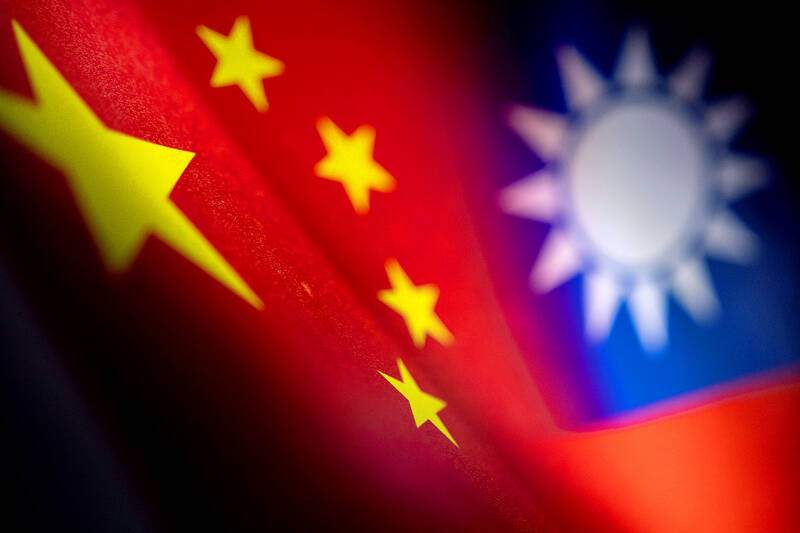More than 80 percent of Taiwanese oppose the “one China” principle and the so-called “1992 consensus,” a survey released yesterday by the Mainland Affairs Council (MAC) showed.
The council last week commissioned a poll to gauge public sentiment regarding comments made on Taiwan during the Chinese Communist Party’s (CCP) 20th National Congress.
Of the 1,096 respondents, 85.6 percent were “strongly opposed” to China’s refusal to renounce the use of force against Taiwan, MAC Deputy Minister Chiu Chui-cheng (邱垂正) told a regular news conference in Taipei.

Photo: Reuters
Meanwhile, 83.9 percent did not support the CCP’s “overall strategy for resolving the Taiwan issue,” while 82.3 percent disapproved of its “one China” principle and the “1992 consensus.”
The “1992 consensus” — a term that former MAC chairman Su Chi (蘇起) in 2006 admitted making up in 2000 — refers to a tacit understanding between the Chinese Nationalist Party (KMT) and the CCP that both sides of the Taiwan Strait acknowledge that there is “one China,” with each side having its own interpretation of what “China” means.
In addition, 79.3 percent disagreed that “peaceful unification under ‘one country, two systems’” is the best way to achieve cross-strait unification.
The results show that Taiwanese are resolutely opposed to political frameworks imposed by the CCP and its plan to find a conclusion to the Taiwan issue, with the public showing extreme disapproval for military intimidation, the council said.
Meanwhile, the survey showed strong popular support for the government’s cross-strait policy, it said.
Nearly 90 percent said they supported improvements to self-defense, while more than 80 percent approved of President Tsai Ing-wen’s (蔡英文) comments in her Double Ten National Day address that “armed confrontation is absolutely not an option for our two sides,” and that working together is possible on the basis of “rationality, equality and mutual respect.”
Additionally, 88.9 percent said they were willing to seek mutually acceptable ways of maintaining peace and stability on the basis of equality and mutual respect.
More than 80 percent supported adjustments to cross-strait exchanges considering cross-strait developments, as well as economic and COVID-19 considerations, while more than 70 percent supported tougher screening of Chinese traveling to Taiwan.
While 78.2 percent said that the CCP is unfriendly to the Taiwanese government, only 61.3 percent said it is unfriendly to Taiwanese.
About 86 percent supported “broadly maintaining the status quo,” while a similar 85 percent said that Taiwan’s future should be decided by its people.
Maintaining peace and stability across the Taiwan Strait is the responsibility of both sides, the council said, calling on Beijing to consider Taiwanese public opinion and current realities, abandon its aggressive mentality, and seek rational, respectful and pragmatic solutions.
The telephone survey, conducted from Wednesday last week to Sunday by National Chengchi University’s Election Study Center, surveyed people aged 20 or older. It had a margin of error of 2.96 percentage points.

A strong continental cold air mass is to bring pollutants to Taiwan from tomorrow, the Ministry of Environment said today, as it issued an “orange” air quality alert for most of the country. All of Taiwan except for Hualien and Taitung counties is to be under an “orange” air quality alert tomorrow, indicating air quality that is unhealthy for sensitive groups. In China, areas from Shandong to Shanghai have been enveloped in haze since Saturday, the ministry said in a news release. Yesterday, hourly concentrations of PM2.5 in these areas ranged from 65 to 160 micrograms per cubic meter (mg/m³), and pollutants were

Taiwan’s armed forces have established response protocols for a wide range of sudden contingencies, including the “Wan Chun Plan” to protect the head of state, the Ministry of Defense (MND) said today. After US President Donald Trump on Saturday launched a series of airstrikes in Venezuela and kidnapped Venezuelan President Nicolas Maduro, concerns have been raised as to whether China would launch a similar “decapitation strike” on Taiwan. The armed forces regularly coordinate with relevant agencies and practice drills to ensure preparedness for a wide range of scenarios, Vice Minister of National Defense Hsu Szu-chien (徐斯儉) told reporters before a

EVA Airways on Saturday said that it had suspended a pilot and opened an investigation after he allegedly lost his temper and punched the first officer several times as their plane was taxiing before takeoff at Los Angeles International Airport. According to a report published on Thursday by The Reporter, the incident occurred after the flight’s Malaysian first officer tried to warn the Taiwanese pilot, surnamed Wen (文), that he was taxiing faster than the speed limit of 30 knots (55.6kph). After alerting the pilot several times without response, the first officer manually applied the brakes in accordance with standard operating

NOT AN OPENING: Trump’s violation of international law does not affect China’s consideration in attacking Taiwan; Beijing lacks capability, not precedent, an official said Taiwanese officials see the US’ capture of the president of Venezuela as a powerful deterrent to Beijing’s aggression and a timely reminder of the US’ ability to defeat militaries equipped with Chinese-made weapons. The strikes that toppled Venezuelan President Nicolas Maduro signaled to authoritarian leaders, including Chinese President Xi Jinping (習近平), US President Donald Trump’s willingness to use military might for international affairs core to US interests, one senior official in Taipei’s security circle said. That reassured Taiwan, the person said. Taipei has also dismissed the idea that Trump’s apparent violation of international law could embolden Beijing, said the official, who was not